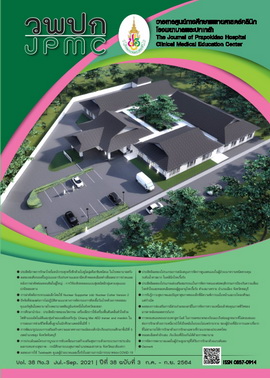Effectiveness of Self - efficacy Promotion in Self - management Program on Cardiovascular Disease Risk Prevention Behavior among Elderly with Chronic Disease in Bang - Sai Sub - district, Mueng District, Chonburi Province
Main Article Content
Abstract
BACKGROUND: Cardiovascular diseases (CVDs) in the elderly is a national public health concern. Therefore, it is important for all key concerned stakeholders to work together to find an effective way to prevent the risk of CVDs in order to maintain the quality of life of the elderly.
OBJECTIVE: To examine the effectiveness of self - efficacy promoting program on self - management behaviors to prevent CVDs risk among the elderly with chronic diseases in Bang - Sai sub - district, Muang district, Chonburi province.
METHODS: This quasi-experimental research was conducted from June to October 2019. Seventy elderly people, who were a risk group suffering from chronic diseases at middle level and over classified by Thai CVD risk scores, were recruited. Participants were divided into two groups (35 each). The experimental group received the promoting program, comprising 6 program activities for 6 weeks, and then a follow up for 4 weeks, whereas the control group received only routine health care services. Data were collected using survey questionnaires, including personal information, perceived self - efficacy, and self - management behavior. Food Records and Physical Activity Questionnaire (PAQ) were used for metabolic equivalent assessment. Clinical outcomes of each individual were also collected. Descriptive statistics, Independent sample t - test, and One - way repeated ANOVA were used for analyzing the data.
RESULTS: The findings found that, after intervention and during follow up period, the average score of perceived self - efficacy, self - management behavior, calorie outtake, waist, Body Mass Index (BMI), blood pressure and Fasting Blood Sugar (FBS) in the experimental group were significantly better than the baseline, with statistical significance at p < 0.05. However, the average calorie intake was found to be statistically better than the baseline during the follow up period only. When comparing between groups, it was found that the experimental group had better results than those in the control group in all aspects, except only the average waist, BMI, and FBS. Besides, the experimental group appeared to control their blood pressure and LDL cholesterol levels better than the control group at the end of the study period.
CONCLUSIONS: The findings suggested that this program can be applied for improving health service quality for elderly with chronic diseases in order to change their self-management behaviors and reduce their CVD risks effectively.
Article Details
References
Ministry of Public Health. 5 Years Strategic National Plan for Prevention and Control of Non-communicable Diseases (2017-2021). Bangkok: Bureau of Non-Communicable Diseases, Department of Disease Control; 2017.
World Health Organization. The Top 10 Causes of Death [internet]. 2019 [cited 2019 Feb 27]. Available from: http://www.who.int/news-room/fact-sheets/detail/the-top-10-causes-of-death
Assantachai P. Health Problem in The Elderly and Guideline for Prevention. 4th ed. Bangkok: Union Creation Co., Ltd.; 2013.
Khonkeaw W. The Health Behavior of Elderly of Klongtumru Sub-district, Mueng District, Chonburi Province. [dissertation]. Chonburi: Burapha University; 2014.
Bang-Sai Sub-district Health Promoting Hospital. Cerebrovascular Risk Surveillance Report. Chonburi: Bang-Sai Sub-district Health Promoting Hospital.; 2019.
Department of Disease Control. CVD Risk Assessment in Diabetic and Hypertension Patients. Bangkok: Bureau of Non-Communicable Disease.; 2017.
Creer TL. Self-management of Chronic Illness. In: Boekaert M, Pintrich P, Zeidner M, editors. Handbook of Self- regulation. San Diego, California: Academic Press; 2000. p. 601-29
Bandura A. Self-efficacy. The Exercise of Control. New York: W. H. Freeman; 1997.
Junchai J, Therawiwat M, Imamee N. Diabetes Education and Self-management Program of Persons with Type 2 Diabetes, Prachuap Khiri Khan Province. The Public Health Journal of Burapha University 2012; 7(2): 69-83.
Vasuthada C, Jaikla N, Prakongsri C, Theamngoen S. The Development of A Self-management Support Model for Non-communicable Disease Prevention among People At Risk of Chronic Illness: Bangkaja, Muang District, Chanthaburi Province. J Prapokklao Hosp Clin Med Educat Center 2019; 36: 142-53
Lemeshow S, Hosmer DW, Klar J, Lwanga SK. Adequacy of Sample Size in Health Studies. New York: John Wiley & Sons; 1990.
Ministry of Public Health. Geriatric Surveillance, and Assessment Manual. 2nd ed. Bangkok: Department of Medical Service.; 2015.
Seesawang J, Thongtaeng P, Yodthong D. Effectiveness of Self-management Supportive Program among Hypertensive Older People. Rama Nurs J 2014; 20: 179-92.
Lee LT, Bowen PG, Mosley MK, Turner CC. Theory of Planned Behavior: Social Support and Diabetes Self-management. J Nurse Pract 2017; 13: 265-70.

